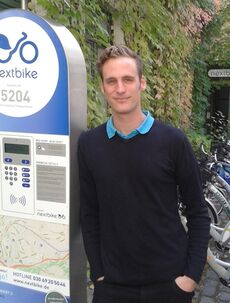


Seven Answers From: Sebastian Schlebusch
Statement: What I always wanted to tell the world about collaborative mobility.
I am concerned with ‘collaborative mobility’ since six years, although I did not know the term as such at that time. Personally, I believe that collaborative mobility is the epitome of sustainable development as the ‘sharing not owning’ principle promotes social cohesion, saves cost for the individual user and decreases resource-consumption during production and consumption-cycles. I am fascinated of being part of a global mega-trend and to be able to contribute to this movement in the slightest way.
Dream scenario: How I wish the mobile world looks like in 2060.
During the year 2060 or even much earlier I hope, the inner cities are free from privately owned cars. The bicycle lanes are as wide as roads and are used by mothers and fathers who bring their kids to nursery with electric cargo bikes. On a fast lane without red traffic lights hurried people drive because they need to go to work. Car traffic only consists of free floating, and stationary car sharing as well as taxi traffic. For 30-50 persons there will be only one car which is available round the clock and everywhere. The motor-driven traffic is completely electric and will be led through one-way roads – in order to leave enough room for the large number of cyclists. Public transport features short-intervall cycles and around the clock service, all financed by large-scale savings in reduced road conservation cost.
Near the border of free-floating Carsharing service-areas, large-scale P+R parking areas featuring access to bike-sharing (including cargo-bikes), stationary Carsharing services, as well as public transport. People that absolutely want to own a private car, are forced to leave it at such P+R parking areas and change the mode of transport to access the inner-cities. In the countryside, every bus-station is equipped with rental E-Bike stations and enough space to safely park and charge the personally owned e-bike. Every village has car-sharing stations and ride-sharing is common to everyone as drivers receive special bonuses in their monthly mobility-invoice for every passenger they pick up and transport. Further, inner-european flights are rendered obsolete by an excellent European – and for Eurasia and Africa even transcontinental – high-speed railway network. Transportation within max. 3-4 hours between the major European cities and departures every 30 minutes, as well as high-capacities guarantee for a seamless travel with maximum comfort.
Booking is conducted via a Smartphone App that suggests alternate traffic routes – taking into consideration all available modes of transport and the personal preferences and settings. All the European mobility services are invoiced by the European Mobility Agency, who calculates the cheapest fares for each month’s total use of transport. The revenue is split automatically among the individual service providers according to certain to usage-based breakdown rates.
Transportation logistics use similar concepts, where cargo from trucks and trains is transferred to small-scale electric delivery vehicles and bikes that are in charge of the small-scale distribution of these goods in the inner-city.
My TOP-moment: In my eyes the biggest success in the history of collaborative mobility.
- The Velib system in Paris. It has sparked a strong consciousness for the chances and perspectives of bicycle rental systems and the number of cities with such rental systems increased enormous since.
- The entrance of the automobile industry in the carsharing market. There are good campaigns since, which animate the bulk for a collaborative mobility behaviour.
My personal mobility behaviour: How I move privately.
Since I need to travel around Germany often for business purposes, my company offers me the BahnCard 100, allowing me to freely use the national railways and most of the local public transport in Germany. At home in Leipzig, I almost exclusively move around by bike – now often with nextbike since my own bicycle was recently stolen. Two to three times a month I rent a car from Teilauto to go Kitesurfing. There I can choose between a large number of models such as open-tops, SUVs or a cost-and fuel-efficient Smart. For big shopping trips and other logistical challenges I sometimes also rent a cargo-bike.
I sold my own car, which I used to own between the ages 18 to 20, during my first term at University due to the high cost and since I didn’t really use it. Now I did not own a car in 10 years and I also do not have access to a car at work – but I don’t miss a thing!
Personal experiences with collaborative mobility: An incident which stayed in my mind.
During my studies I worked as a fundraiser / promoter for different environmental protection organizations. 2009 we worked for a campaign concerning an alternative to the „Stuttgart 21“ project. Normally the agency allocated a rental car for each promotion-team. But because we had a bicycle rental system right on our doorstep, we took the bicycle to go to work every day. The idea caught on and even today – four years later – the team photos with the rental bikes decorate all booklets and websites of the Agency.
The incident that sparked my interest in shared mobility solutions:
That was definitely my study and work related visit in Delhi, India, in the years 2007 and 2010. There, each year 0.5 million new motor vehicles get permitted. In 2010 there were more registered cars in Delhi than in the three other mega-cities of India (Mumbai, Kolkatta, Chennai) together, leading to the limit of the transportation infrastructure being reached by far.
As a student from the german city Münster and bicycle geek my interest was at that time more in the bicycle as a means of transportation rather than bike-sharing as a concept. The thematic expansion of my interest was finally the logic consequence of the combination of interests in improvement of mobility, augmentation of the bicycle image of young, urban and technical interested audiences and the creation of business models for private service providers of innovative mobility service providers.
Ready for action: If I could, I would next…
…world domination. But of course in a nice and agreeable manner. My vision is to have dense rental-bike networks in every major city.
DATABOX:

Name: Schlebusch
Firstname: Sebastian
Function: Head of International Business Development
Company: nextbike GmbH
Head Office in: Leipzig
Founded in the year: 2004
Number of collaborators: 40-50
The Business Idea in summary:
No other public bike sharing system can provide a larger international network of rental bikes. Founded in Leipzig in 2004 as a regional enterprise, today nextbike is present in more than 80 cities in Germany, Austria, Latvia, Poland, Switzerland, Turkey, Azerbaijan, Cyprus, the United Arabian Emirates and even in New Zealand. „nextbike“ – the name says it all: always having a bike close by. Our bicycle fleet stands for urban mobility that is inexpensive, flexible and healthy.
Website:
www.nextbike.de
www.unternehmen.nextbike.de


